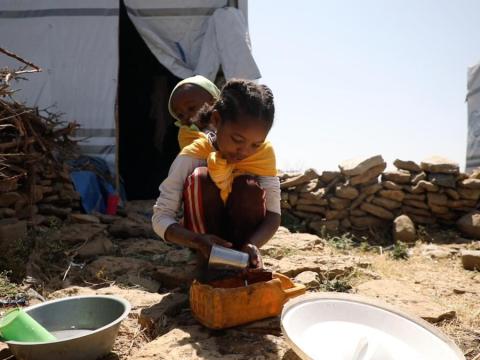Ration Cuts Leave Displaced Families and Children Hungry, Vulnerable and Forgotten – World Vision

- Children in food-insecure households are eight times more likely to engage in child labour and nearly six times more likely to be married early.
- Families who had their food rations reduced were over five times more likely to face severe food insecurity
- 38% of families reported mental distress among children, such as increased anxiety, depression, and behavioural issues.
In the lead up to World Refugee Day, a stark new report by World Vision reveals the devastating toll that humanitarian funding cuts are taking on displaced families and children across 13 crisis-affected countries. Titled “Hunger, Harm, and Hard Choices,” the report highlights a dangerous surge in hunger, child labour, forced marriage, school dropouts, and child trafficking—much of it concentrated among people who have already been forced to flee their homes and now rely on ever-dwindling humanitarian support.
The study, conducted between January and April 2025, surveyed more than 5,000 refugee, internally displaced and host family households. It found that 58% are now experiencing severe hunger, with nearly half saying they have gone entire days without food. In South Sudan, a staggering 97% of families reported that someone in their household had gone a full day and night without eating anything in the past month. Similarly, 89% of families in Ethiopia and the Democratic Republic of Congo said they had endured this level of deprivation. Cuts to food assistance were directly linked to this suffering—families who had their food rations reduced were over five times more likely to face severe food insecurity.
“This is a humanitarian catastrophe hiding in plain sight,” said Amanda Rives, Senior Director of Disaster Management at World Vision International. “These are families who have lost everything to conflict or disaster. Now we’re taking away the one thing they had left: life-saving food assistance. It’s unconscionable.”
The consequences are harrowing and immediate. Families reported that hunger is forcing children out of school and into exploitative situations. Many are being made to work, beg, or even enter into early marriages in order to help their families survive. One mother from a refugee camp in Uganda said, “My daughter wanted to become a teacher. Now, she spends her days searching for scraps to sell at the market. She's 12.”
World Vision’s findings show that children in food-insecure households are eight times more likely to be engaged in child labour and nearly six times more likely to be married early. The likelihood of children being forced to beg increased by more than nine times, and the risk of exposure to violence rose nearly fivefold. The psychological toll is also immense: 38% of families reported seeing increased anxiety, depression, and behavioural changes in their children. Meanwhile, nearly half of all parents said their children could no longer attend school regularly because they had to help find food or earn money.
“We are not just witnessing a hunger crisis. We are witnessing the systematic dismantling of childhood,” said Rives. “We are seeing children forced out of classrooms into dangerous work, early marriage, and exploitation simply because they don’t have enough to eat. A child who is hungry cannot learn. A child who is working to feed their family cannot grow. A child who is married at 13 has had her future stolen before it began.”
Rives called for urgent international action to reverse course, restore humanitarian assistance, and prioritise displaced populations in humanitarian responses. “What these families need is not charity—they need justice. They need consistent, reliable support that acknowledges their dignity and humanity. We must stop rationing compassion.”
World Vision is urging donors and governments to increase funding for life-saving humanitarian assistance, especially in displacement contexts, and to invest in long-term solutions that help communities build resilience and secure a future for their children.
“If we fail to act now,” warned Rives, “we will not only lose lives—we will lose the future of an entire generation.”
About the Report
This new study is a follow-up to World Vision’s 2024 report, “Ration Cuts: Taking from the Hungry to Feed the Starving” and explores how reductions in food assistance are impacting displaced and host communities. Conducted in partnership with the World Food Programme (WFP), the report draws on data from 13 crisis contexts, including Syria, Lebanon, Bangladesh, Myanmar, Somalia, Ethiopia, South Sudan, Uganda, Mali, Central African Republic, and the Democratic Republic of Congo. Over 5,000 households were surveyed, along with focus groups and expert interviews, to assess the links between food insecurity and education, child protection, mental health, and family coping strategies.
The report does not claim to represent entire national populations but instead offers a stark snapshot of the lived realities of displaced families facing the most extreme impacts of aid cuts.
World Vision is a Christian humanitarian organisation dedicated to working with children, families and their communities to reach their full potential by tackling the root causes of poverty and injustice. World Vision serves all people, regardless of religion, race, ethnicity or gender. For more information, please visit www.wvi.org